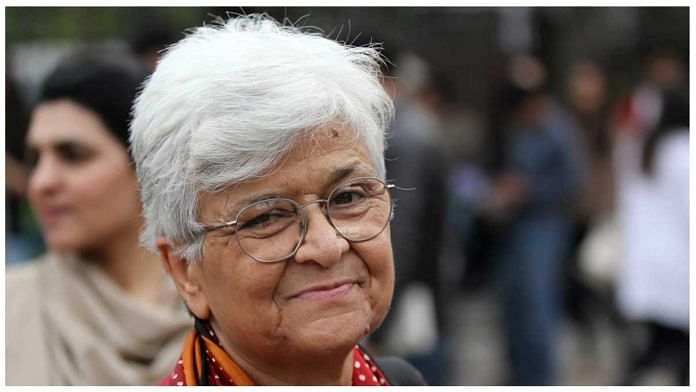New Delhi: The voice of eminent feminist icon, poet and author Kamla Bhasin was a prominent one in the women’s movement in India, as well as in other South Asian countries.
Her calls for women to break all shackles and build a new world — ‘Tod tod ke bandhanon ko dekho behne aati hai… aayengi zulm mitayengi… yeh to naya zamaana laayengi’ — brought a vigour to the feminist movement in the region in the 1970s, and inspired a generation.
Bhasin passed away at the age of 75 in the early hours of Saturday. Activist Kavita Srivastava shared the news of her demise on Twitter. She wrote that Bhasin died around 3 am. She was reportedly diagnosed with cancer a few months ago.
Kamla Bhasin, our dear friend, passed away around 3am today 25th Sept. This is a big setback for the women's movement in India and the South Asian region. She celebrated life whatever the adversity. Kamla you will always live in our hearts. In Sisterhood, which is in deep grief pic.twitter.com/aQA6QidVEl
— Kavita Srivastava (@kavisriv) September 25, 2021
Bhasin wrote extensively on gender issues and emphasised how feminism is not a war between men and women, but a fight between two ideologies. She fought for equal rights for over four decades, and was best known for her work with South Asian feminist network Sangat, which has trained several thousand women on gender issues.
Bhasin also authored several books on the feminist movement, including Understanding Gender and What is Patriarchy. Her books have been translated into over two dozen languages. She has also been credited with bringing to India the ‘azadi’ chant, which reportedly was first used by Pakistani feminists to protest against the Zia-ul-Haq regime in 1984.
Also read: ‘Financial feminism’ is how women can bridge the gender pay gap in their careers
‘Midnight’s Children’ generation
Bhasin was born in 1946, a year before the Partition, in Punjab’s Shahidanwali village (now in Pakistan). She was the eldest of five siblings.
After she finished her MA from Rajasthan University, she got a fellowship to study Sociology of Development at Muenster University in West Germany. Upon finishing it in the mid-1970s, she taught at the Orientation Centre of the German Foundation for Developing Countries in Bad Honnef for about a year.
She worked at the UN Food and Agriculture Organization and conducted gender training for women from South Asia in Thailand, before being posted to New Delhi. She worked with the UN till 2002. In 1998, she founded Sangat.
Over decades of work, she wrote dozens of books, sang songs celebrating womanhood and spearheaded several women’s movements.
She referred to herself as the “Midnight’s Children generation”, and spoke about how a year after her birth, Shahindanwali became Pakistan and her family became Indian.
“My place of birth and the land of our ancestors became not only foreign, but an enemy country. I have spent my entire adult life dreaming of, and working for, peace and cooperation between the two countries I belong to,” she was quoted as saying.
This also impacted and motivated her work. She co-wrote Borders & Boundaries: Women in India’s Partition with author and publisher Ritu Menon. The book focused exclusively on how India’s Partition impacted women, as they struggled to put their lives back together again. The two authors documented women’s experiences during the Partition, giving birth to a feminist reconsideration of its historiography.
Feminists mourn her passing
Soon after the news of her demise spread, several people tweeted their condolences and spoke about how Bhasin and her work impacted their lives. Some quoted her work, while others thanked her for being a “beacon of feminist hope”.
Woke up to the news of demise of another South Asian feminist icon. She breathed her last at 3 am today. Rest in power Kamala di.
"Men should recognise that they can be fully free only when women are fully free." – Kamala Bhasin
— Rituparna Chatterjee (@MasalaBai) September 25, 2021
Kamla Bhasin was and will always be a beacon of feminist hope, her ideas and thoughts helped shape me on multiple occasions. And while yes we will always miss her but her words will guide young girls everywhere, forever.
Rest in power, Kamala https://t.co/jafCo9xu5B
— richa singh (@richa_singh) September 25, 2021
“I know enough women who are totally patriarchal, who are totally anti-women: who do nasty things to other women, and I have known men who have worked for women’s rights their whole life. Feminism is not biological: feminism is an ideology”.
Kamala Bhasin. (1946-2021)
RIP pic.twitter.com/I3ybPkm6bB
— sanjoy ghose (@advsanjoy) September 25, 2021
Another Twitter user wrote about how Bhasin’s book “shocked” him and how he hopes she keeps “shocking more adolescent boys”.
I think I was 10 may be 12 years old when I picked up a book with the title 'What is Gender' which came out of my mother's bag while she was unpacking, it was slim, colourful and attractive. It shocked me. Thank you Kamala Bhasin, I hope you keep shocking more adolescent boys.
— Om Prasad (@omprasad_14) September 25, 2021
Also read: Gail Omvedt took caste to global audience that was fed only a Brahminical point of view



